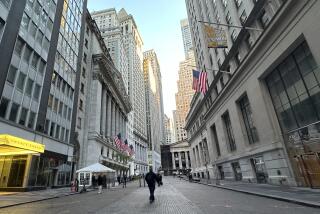Stocks move higher, extending rally
- Share via
LOS ANGELES AND NEW YORK — Investors worldwide cast more bets Tuesday for an economic recovery, driving stocks and commodity prices higher after a surprise interest rate hike in Australia.
But rising confidence undermined the dollar as a haven. So, too, did fresh rumors that Mideast oil producers want to reduce their reliance on the greenback in pricing crude.
The weakened dollar helped push gold to a record high, above $1,035 an ounce, as faith in the buck waned.
On Wall Street, the Dow Jones industrial average jumped 131.50 points, or 1.4%, to 9,731.25, its second straight gain after pulling back modestly in the last two weeks on worries the economy might be stumbling again.
Those concerns took a back seat Tuesday after Australia’s central bank raised its benchmark short-term interest rate to 3.25% from 3%.
Although stocks usually react badly to rising rates, in this case Australia’s move -- the first increase by any major central bank this year -- underscored the idea that the global economy was rebounding.
“The risk of serious economic contraction” in Australia has passed, the central bank said in a statement.
The decision helped push European stock indexes up more than 2% for the day.
Renewed hopes for economic growth also boosted optimism among U.S. stock market bulls who believe corporate earnings will continue to rebound. Third-quarter reports begin rolling out this week.
“Stocks are following earnings, and earnings are likely to be improving,” said Lawrence Creatura, a portfolio manager at Federated Clover Capital Advisors in Rochester, N.Y.
Yum Brands, which owns the KFC and Taco Bell fast-food chains, on Tuesday said earnings in the quarter ended Sept. 5 jumped 18% from a year earlier, despite a 2.3% decline in sales.
The report, issued after markets closed, lifted Yum’s shares to $35.46 after hours. They had inched up 1 cent to $34.86 in regular trading.
Overall, third-quarter operating earnings of the Standard & Poor’s 500 companies are expected to be down 24.8% from a year earlier, based on analyst estimates tracked by Thomson Reuters. That would be a smaller decline than the 27.3% drop in the second quarter.
Wall Street is betting on broad-based earnings growth resuming in 2010, and for that reason many portfolio managers say they’re reluctant to sell stocks, and are more inclined to buy.
“The companies we talk to are seeing improvement in their businesses,” said Mark Foster, a principal at money manager Kirr Marbach & Co. in Columbus, Ind.
Bullish investors and traders were buying stocks across the board Tuesday. Winners outnumbered losers by about 4 to 1 on the Big Board. The Standard & Poor’s 500 rose 14.26 points, or 1.4%, to 1,054.72. The Nasdaq composite gained 35.42 points, or 1.7%, to 2,103.57.
After reaching a 2009 closing high of 1,071.66 on Sept. 22, the S&P; 500 had pulled back 4.3% through Friday before resuming its climb this week.
Market pessimists contend that stocks’ powerful rally since March has pushed share prices far ahead of the economy’s progress. They note that the government’s report on September employment showed the U.S. lost a net 263,000 jobs last month, well above economists’ estimate of 175,000.
Some investors’ concerns about the U.S. economy’s outlook have led them to buy gold as a refuge.
The metal, which rose above $1,000 an ounce last month for the first time since February, shot to a record Tuesday. Near-term gold futures jumped $21.90, or 2.2%, to $1,038.60, topping the previous record close of $1,033.90 in March 2008.
Gold benefited from renewed weakness in the dollar, after Britain’s Independent newspaper said Arab states, China, Russia and other countries were in secret talks to stop pricing oil in dollars and shift to a basket of currencies.
In theory, that would limit the penalty that oil producers face from a sliding U.S. currency. It also could pose another threat to the dollar’s status as the world’s preeminent currency -- a position that has allowed the U.S. to borrow record sums in this decade to finance tax cuts, the war in Iraq and the financial-system bailout.
Saudi Arabian Central Bank Gov. Muhammad al Jasser said the newspaper story was “absolutely incorrect.”
Although the dollar lost more ground Tuesday after drifting lower for most of this year against other major currencies, the decline was modest. An index that measures the dollar’s value against six other key currencies including the euro and the yen eased 0.4% from Monday. The index is off 14% since early March.
Many analysts say the greenback is likely to continue declining in the near term, in part because near-zero U.S. short-term interest rates encourage money to flow to countries with higher rates.
The beneficial effect of a weak dollar is to make U.S. exports cheaper. But it also means Americans are losing purchasing power. That helps boost gold as an alternative.
What’s more, some investors are turning to gold because they believe higher inflation is inevitable, given the huge sums the U.S. and other nations have pumped into the financial system.
Yet there are few signs of inflation in the U.S. or abroad. And despite gold’s new high, one barometer of inflation expectations -- interest rates on U.S. Treasury bonds -- showed little reaction. The yield on the 10-year T-note edged up to 3.24% from 3.22% on Monday.
The T-note has dropped from nearly 4% in mid-June.
“The bond market isn’t sweating inflation,” said Matt Zeman, a metals trader at La Salle Futures in Chicago.
--
More to Read
Inside the business of entertainment
The Wide Shot brings you news, analysis and insights on everything from streaming wars to production — and what it all means for the future.
You may occasionally receive promotional content from the Los Angeles Times.










